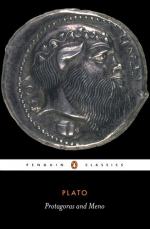
|
| Name: _________________________ | Period: ___________________ |
This test consists of 15 multiple choice questions and 5 short answer questions.
Multiple Choice Questions
1. What was the occupation of the father of the third party in the dialogue between Meno and Socrates?
(a) Sophist.
(b) Teacher.
(c) Senator.
(d) Business man.
2. What did Meno compare Socrates to while explaining what he was infected with?
(a) An asp.
(b) A stingray.
(c) A cobra.
(d) A scorpion.
3. Why did Meno say some men got bad things?
(a) They were trying to get virtue.
(b) They were cursed.
(c) They did not have virtue.
(d) They did not know they were bad.
4. Why did Socrates say he could not teach virtue?
(a) He could not define it.
(b) He was too busy.
(c) He did not possess it.
(d) He had never tried.
5. How could a man not be virtuous when acquiring good things?
(a) Getting them at the wrong times.
(b) Getting them through bad methods.
(c) Getting them for the wrong reasons.
(d) Getting them in the wrong quantities.
6. Where did the dialogue between Meno and Socrates take place?
(a) Sparta.
(b) Rome.
(c) Thebes.
(d) Athens.
7. What did Socrates say virtue meant to leaders?
(a) Teaching followers.
(b) Having mercy.
(c) Having an objective mind.
(d) Dealing with justice.
8. What did Socrates say immediate pleasure could cause?
(a) All of the answers are correct.
(b) Lasting wealth.
(c) Long term pain.
(d) Relief.
9. How many parts of virtue did Protagoras say there were?
(a) 6.
(b) 4.
(c) 5.
(d) 7.
10. What kind of diet did Socrates promote in his statement about pain?
(a) Liquid.
(b) Carnivorous.
(c) Vegetarian.
(d) Starvation.
11. Why did Protagoras not have a true hometown?
(a) He was an orphan.
(b) He traveled for a living.
(c) His town was destroyed.
(d) He was banished from his town.
12. What did Socrates' theory of learning give people the courage to do?
(a) Have faith.
(b) Let go of their past.
(c) Get educated.
(d) Teach others.
13. Why did Socrates say strength would not be a part of virtue?
(a) It was not universal.
(b) It was universal.
(c) It could be used foolishly.
(d) It is not something recalled by memory.
14. Whom were the only people claiming to teach virtue at the time of Socrates?
(a) The gods.
(b) Sophists.
(c) Universities.
(d) Religious men.
15. Who joined the dialogue between Socrates and Meno?
(a) Sophocles.
(b) Plato.
(c) Anytus.
(d) Protagoras.
Short Answer Questions
1. Which of these was NOT one of the good things Socrates said men should want?
2. What did Socrates say brave men were always ready to do?
3. How did Meno know Gorgias?
4. Why did Socrates say men liked to look at dancers?
5. What major element did Socrates use in his argument against Protagoras?
|
This section contains 436 words (approx. 2 pages at 300 words per page) |

|




